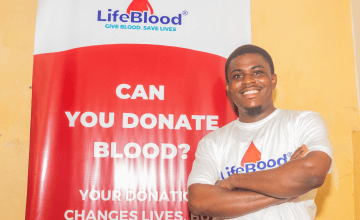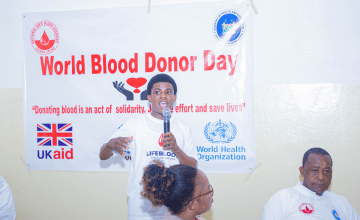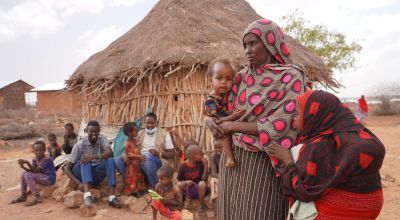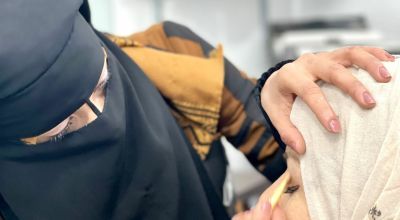
Read our 2024 annual report

Knowledge Hub
For Joseph David Koroma, the issue of blood donation is quite literally in his blood.
When he was a newborn baby, he needed a life-saving blood transfusion. However, in Sierra Leone where he was born, blood donation supplies are critically low. Fortunately for Joseph, someone came to offer a donation, and it was a match.
“There was no blood available for me, but someone came along, and it was a match, he donated, and I was saved. My mom said, ‘maybe this is why God did this,’ it’s always there with me, I’m in the world to solve the blood problem. It’s not an easy task but it’s one I have to do it,” said Joseph.
And fixing the ‘blood problem’ in Sierra Leone is exactly what Joseph is on the path to do. He’s using his medical training and self-taught coding and software development skills to save others in similar situations.
A final year medical student, Joseph has been developing and successfully piloting a digital blood donation platform which is revolutionising the blood donation service in Sierra Leone.

Voluntary blood donation in the West African country is critically low at less than 1% of the general population (WHO recommend a minimum of 10%, it’s 3% in Ireland), which leads to serious blood shortages and loss of life. 85% of patients that require a blood transfusion do not have access to blood.
Joseph developed Lifeblood, a safe blood information management system to increase public awareness and the number of voluntary blood donations, along with improving the efficiency of blood banks by digitising the traditionally paper-based systems used to track the availability of blood.
Concern Worldwide formed a partnership with Joseph’s tech start-up AutoHealth in 2022 to pilot LifeBlood. It resulted in an 150% increase in donors and a total increase in the supply of blood products from 15% to 84% of what was needed for basic treatments.
“In just six months we saved over 4,500 lives. That for me is the most important thing,” said Joseph.
“We need to have the data that tells us what blood is available, which emergency blood donor is nearby, and what blood donation campaigns have achieved. Blood is very critical to everyone’s life, one in three individuals will need blood in their lifetime. Our major aim is to become data for public good.”
The 'blood problem'
The largest requirements for blood in Sierra Leone are patients with cancer and blood diseases such as malaria; anaemia (not having enough healthy red blood cells or haemoglobin to carry oxygen to the body's tissues); surgery, childbirth and trauma, and road accidents.
46% of maternal deaths in Sierra Leone are due to post-birth haemorrhage (bleeding). The country also has one of the highest infant mortality rates in the world, at 104.7 deaths per 1,000 live births with the leading causes of death being haemorrhages and malaria.
In just six months we saved over 4,500 lives. That for me is the most important thing.
LifeBlood takes a multi-faceted approach, with different apps and platforms depending on the end user. The Community Mobile app allows the public to schedule donations, track donor status and receive notifications. The Blood Bank app is used by blood bank staff to input critical donor information and manage blood stocks. The Clinician app allows real-time access to blood availability, allowing healthcare professionals make medical decisions, requests blood transfusions and manage patient needs.
The Data Hub (M&E) app allows authorities to manage, monitor, and generate data on blood bank and community activity. The campaign application allows individuals and organisations to create and monitor their blood donation campaigns.
Using a multitude of skills to create LifeBlood
A self-described ‘nerd’, Joseph was a senior prefect in primary school and head boy in secondary school, with a love of reading, art (he sold his artwork while in school), maths and science. His great passion was physics and he would constantly be in the physics lab.
However, the opportunities to develop those skills into a profession were limited within Sierra Leone, so turning to Google, Joseph searched for how he could realistically use this passion and decided on software development and coding. He started to teach himself, reading books, watching videos on YouTube, whatever he could get his hands on.
It was when he got to medical school that the idea for LifeBlood was born. An internship at a tech company, a position as secretary general at the Sierra Leone Medical Students’ Association, and a stint as an assistant in the publication and communications team of the International Federation for Medical Student Association in Geneva (the first time someone from Sierra Leone worked for the organisation), added to Joseph’s skill set enabling him to get the project and the pilot off the ground.
“I had to do a lot of things. I was coding, going to meetings, I was the developer, I was the graphic designer. I was doing five things in one because I needed to make sure every area of LifeBlood was perfect, because as soon as there is a small mistake or small problem, people give up saying, ‘it’s not working, we don’t want it.’ I had to make sure it was working, it’s something that I achieved, developing it was massive,” said Joseph.

Looking towards the future
LifeBlood has helped Sierra Leone to become one of the first countries in west Africa to have a digital blood management service. It launched to the public in March 2023 as part of the Sierra Leonean government’s National Safe Blood Service.
“LifeBlood is a home-grown solution to the crisis affecting blood supplies. The app was developed with users in mind and responds to the queries, needs and concerns of blood donors in Sierra Leone. Through the development and launch of the app the Lifeblood team have been able to raise public awareness and support for this vital component of health care”, said Sarah Cundy, programme director with Concern in Sierra Leone.
There is potential to replicate and expand LifeBlood to other countries, and there has been strong interest from Burkina Faso, Nigeria, Liberia, Kenya and Cameroon. The model has been developed to be readily adapted for different countries, however without funding this cannot happen.
In April 2025 LifeBlood was a top three finalist out of over 500 entrants in the West Africa Start-up World Cup Regional Finals. It previously won the Orange Mobile Social Venture Prize Middle East and Africa, International Grand Prix in 2022.
For now, Joseph is concentrating on his final year of medical school, writing his dissertation on tuberculosis after contracting the illness himself in 2023, the same year the LifeBlood pilot was launched. Despite being in the ICU and having to learn to walk again, he completed his rotation and passed his exams. His determination and drive to succeed is likely to ensure that LifeBlood will fix not just the ‘blood problem’ in Sierra Leone, but across the region.




